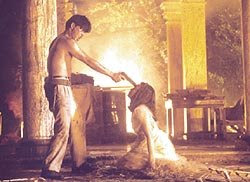
Anyway, Tuli was a digital work by the indie director Aureus Solito that was shown at the Cinemanila and at Sundance. This was his second film after the celebrated Ang Pagdadalaga ni Maximo Oliveros. I am not sure if this film ever had a local commercial run because it received an X rating from the MTRCB for a lesbian kiss, among others. I think the topic was rather risque at best, although it wasn't really the crux of the story. Artfully shot with a little sepia glow to it (or maybe that's just how most Pinoy films are when viewed on DVD), it has a rather engaging narrative. Bravo to the young actors; they really deviated much from their protected-teen images to deliver very endearing and convincing performances.

I thought I'd never ever get to see this Gallaga masterpiece. You know, in my college days, people will only get to see this film by visiting the UP Film Center in Diliman and that alone doesn't even guarantee you a screening. Nestor de Torre brought this along with him during his national speaking tour and that's when my Mom saw it in Xavier University. Now, you can own a legit copy of this obra maestra for only Php 199. So cheap for something so priceless (note the irony in this sentence).
ORO, PLATA, MATA (Gold, Silver, Bad Luck - or something like that; Mata means something else in Spanish actually and it's not "death"!) was filmed in 1982 and set entirely in Negros (where Gallaga hails from). It won in that same year the Gawad Urian for Best Picture, direction, cinematography, production design, musical score and sound. If at all, we only have the Experimental Cinema of the Philippines and the Philippine National Bank (funder?) to thank for this film. It was also shown during the opening night of the first (and last) Manila International Film Festival in 1983 at the Manila Film Center. I loved the performances of the women actors, everyone deserving of an award (if only!). I loved Liza Lorena, most especially. I have always been a huge fan of hers. Too bad she isn't given any substantial roles these days. Gossip says Mitch Valdez regretted doing the topless scene, but hey! That was integral to her role as a liberated, US-educated doctor. Kuh Ledesma's role here is weird. She appears as a diwata. She represents, of course, the innocence (and the destruction thereof) that was inherent in the national character that was left scarred by the war.
My interest in ORO, PLATA, MATA was piqued by my current interest in this Thai soap entitled Four Reigns, which came from a book written by a former Prime Minister about a woman whose life spanned four kings. I was thinking that perhaps there could be a Philippine equivalent, and I think Oro is it. Compared to Four Reigns, however, Oro has so much tension - name it, it has it - and sex and violence and intrigue, something which is sorely lacking in its Thai equivalent (which made me think Four Reigns will never make it to local television). Every Filipino cineaste worth his salt should make Oro, Plata, Mata required viewing.
Lastly, I saw Himala. By now, it was already past mignight but I've been having problems sleeping lately that I didn't even quite notice the time. I have seen this thrice, twice on ABS-CBN and last night on DVD. Yes, you can now own a copy of this precious Bernal for only Php 199! Himala premiered in 1981. Although it didn't get the elusive Urian nod, it won in the 1982 Metro Manila Film Festival (Best Actress, Best Film, Screenplay, etc.) was eventually shown in Chicago and Berlin. The Manunuri, however, made up for its oversight by declaring Bernal the Most Outstanding Filmmaker of the Decade (1971-1980). He also was conferred the National Artist Award albeit posthumously. Himala was also shown, along with Oro, during the opening of the 1983 Manila International Film Festival. I don't need to mention here what this film says about the Filipino, but the need to believe in something is still a quest for so many.


No comments:
Post a Comment